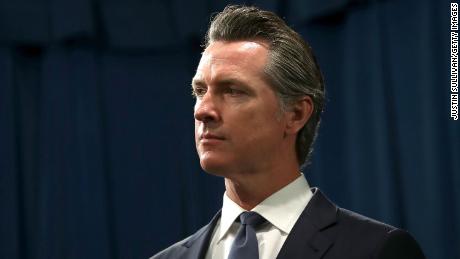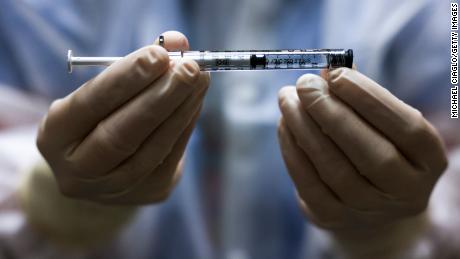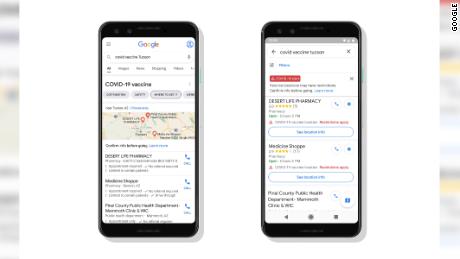“We’ve seen what happens in other countries that have actually had coronavirus under relatively good control, then these variants took over and they had explosive spread of the virus, and then overwhelmed hospitals,” emergency physician Dr. Leana Wen told CNN’s Anderson Cooper.
“If there is something more contagious among us, if we thought that going to the grocery store before was relatively safe, there’s actually a higher likelihood of contracting coronavirus through those every day activities,” she said.
“Wearing an even better mask, reducing the number of times that we have to go out shopping, or in indoor crowded settings, all of that will be helpful,” Wen added.
Dr. Anthony Fauci told NBC Monday wearing two masks is likely more effective in stopping the spread of the virus.
“If you have a physical covering with one layer, you put another layer on, it just makes common sense that it likely would be more effective,” he said.
Moderna says its vaccine protects against some variants
The good news, Fauci told CNN in a separate interview Monday, is that current Covid-19 vaccines are likely to be effective against the new variants.
“The sobering news,” he added, “(is) as you get more and more replication, you can get more and more of evolution of mutants, which means you always got to be a step ahead of it.”
But as Covid-19 evolves, it will be important to prove “time and time again” that vaccines provide protection against new strains, Moderna president Dr. Stephen Hoge said during a panel Monday.
“Until we’ve got this thing sort of fully suppressed and in control, and people are broadly vaccinated or seropositive and protected against it, it’s going to be an ongoing battle for the next couple of years,” he said.
Meanwhile, Johnson & Johnson’s vaccine is currently being tested in South Africa, the US and Brazil, and those results could provide insight into how well it works against emerging variants, one of its developers said. The company has said it could share its Phase 3 vaccine trial data as early as this week.
“If we see the efficacy results … it’ll give us insights not only into whether or not this vaccine candidate is effective, but it’ll also give us insights into whether or not the variants that are circulating in South Africa might be a problem for vaccines,” Dr. Dan Barouch, a Harvard Medical School professor, told CNN.
6% of the US population has gotten a Covid-19 shot
data. More than 3.3 million are fully vaccinated.
That’s about a 50% faster pace than the goal of a million doses per day he’s promised since before inauguration.
A White House official told CNN the administration’s official goal remains getting 100 million shots administered in the President’s first 100 days in office.
Across the country, health leaders and state officials have been working to enhance their vaccination strategies and boost the number of shots going into arms.
CVS will begin offering on-site vaccinations at more than 270 locations across 11 states in February, Dr. David Fairchild, associate chief medical officer at CVS Health, said Monday.
“We’re definitely prepared and want to play a large role in helping to get the vaccine out there,” he added. “Our internal goal is to have a capacity to perform 25 million shots a month or more.”
West Virginia Gov. Jim Justice debuted a new online pre-registration system Monday, which allows residents to pre-register to receive a vaccine. Since the system’s launch Monday morning, more than 32,000 residents had scheduled a vaccine appointment, the governor said. That will work alongside an existing hotline that residents can call and pre-register.
Illinois announced it was entering its next stage of vaccinations Monday, opening guidelines to people 65 and older and frontline essential workers including teachers, first responders and grocery workers. The governor added as more doses become available, more mass vaccination sites will open up
Chicago will target 15 “high-need communities based on the City’s COVID vulnerability index,” the mayor’s office said in a news release. The initiative will include “strike teams” that will reach to “those who may be disconnected from more traditional vaccine administration channels,” it said.
“Our city is two-thirds people of color,” Mayor Lori Lightfoot said in a news briefing. “Yet we are falling woefully behind in the number of people of color who’ve been vaccinated today.”
Lightfoot said that of the nearly 108,000 residents who have received their first vaccine dose, only 17% are Latino and about 15% are Black.
Supply still limited
But many states are still struggling with supply.
Kentucky has used about 88% of their first doses so far, Gov. Andy Beshear said Monday, and called on the federal government to send more supply.
Beshear told reporters the state reached an all-time high vaccination rate last week with more than 82,500 doses administered, but highlighted the state could be in the range of 250,000 doses weekly if the supply was there.
Colorado Gov. Jared Polis also renewed a call for more vaccines as the state continues to exhaust the supply allocated by the federal government.
“I continue to urge our federal partners and the new Biden administration in Washington to ramp up vaccine distribution right away,” Polis said in a statement. “Colorado is ready to immediately use three to four times as many vaccines as we are currently getting each week right away.”
The state has so far administered more than 458,400 shots, more than 82,600 of which are second doses.
“The sooner Colorado gets more vaccines, the quicker we can get them into arms, and the faster we can help our small businesses and economy build back stronger,” the governor said. “We’re ready and welcome renewed federal assistance to get the job done.”
CNN’s Lauren Mascarenhas, Chris Boyette, Taylor Romine, Gisela Crespo, Omar Jimenez, Amanda Sealy, Andrea Diaz, Leslie Perrot, Maggie Fox and Naomi Thomas contributed to this report.









